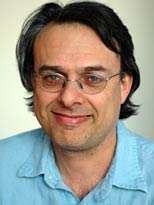Stephen Yablo
Stephen Yablo is a Canadian-born American philosopher. He is David W. Skinner Professor of Philosophy at the Massachusetts Institute of Technology (MIT), and taught previously at the University of Michigan, Ann Arbor.[1] He specializes in the philosophy of logic, philosophy of mind, metaphysics, philosophy of language, and philosophy of mathematics.
Stephen Yablo | |
|---|---|
 | |
| Education | University of Toronto (B.Sc.) University of California, Berkeley (Ph.D.) |
| Spouse(s) | Sally Haslanger |
| Era | Contemporary philosophy |
| Region | Western philosophy |
| School | Analytic |
| Doctoral advisor | Donald Davidson |
Main interests | Philosophical logic, philosophy of language, philosophy of mathematics, philosophy of mind |
Notable ideas | Yablo's paradox |
He is married to fellow MIT philosopher Sally Haslanger.
Education and career
His Ph.D. is from University of California, Berkeley, where he worked with Donald Davidson and George Myro. In 2012, he was elected a Fellow of the American Academy of Arts and Sciences.
He was born in Toronto, ON to a Polish father Saul Yablo and Romanian-Canadian mother Gloria Yablo (née Herman), both Jewish.[2]
Philosophical work
In 1993, he published a short paper showing that a liar-like paradox can be generated without self-reference. He has published a number of influential papers in philosophy of mind, philosophy of language, and metaphysics, and gave the John Locke Lectures at Oxford in 2012, which formed the basis for his book Aboutness, which one reviewer described as "an important and far-reaching book that philosophers will be discussing for a long time."[3]
Books
- Thoughts (Philosophical Papers, volume 1) (Oxford University Press, 2009)
- Things (Philosophical Papers, volume 2) (Oxford University Press, 2010)
- Aboutness (Princeton University Press, 2014).
References
External links
- "Paradox Without Self-Reference" - Analysis, vol. 53 (1993), pp. 251–52
- "Mental Causation" - The Philosophical Review, vol. 101, issue 2 (1992), pp. 245–280
- "Go Figure: A Path Through Fictionalism"
- Interview at 3:AM Magazine